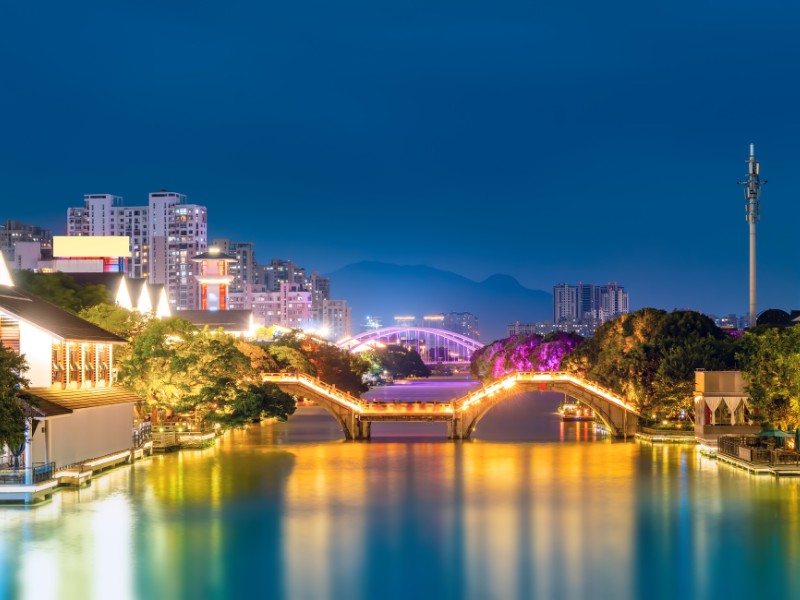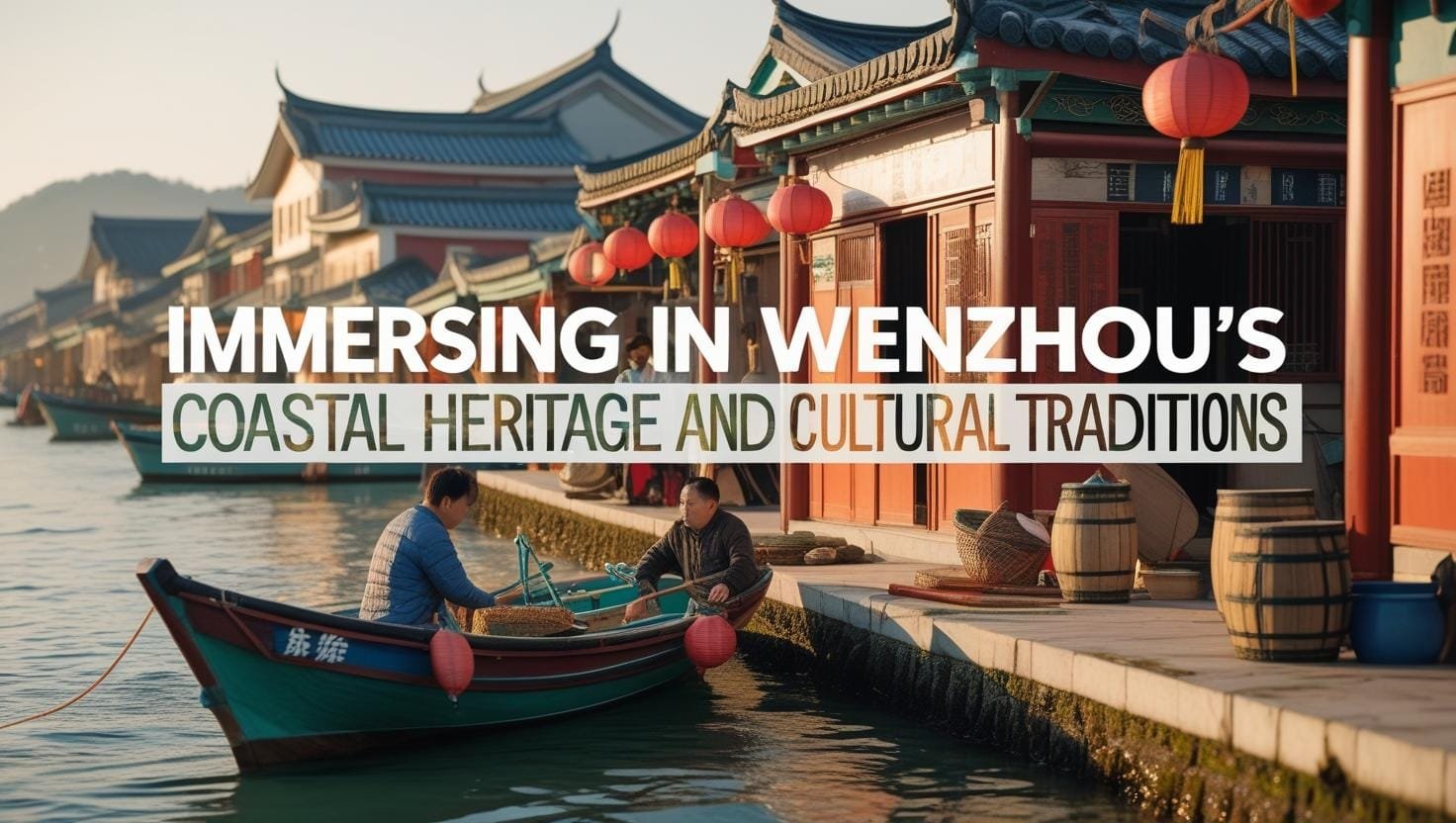Immersing in Wenzhou’s Coastal Heritage and Cultural Traditions
Welcome to the fascinating world of Wenzhou, a hidden gem on China’s southeastern coast where history, culture, and the sea intertwine to create an unforgettable experience. If you’re a traveler eager to explore Wenzhou Coastal Heritage, you’re in for a treat. This vibrant city, with its rich tapestry of Wenzhou cultural landmarks and deep roots in China maritime culture, offers a perfect blend of ancient traditions and modern allure. Whether you’re a culture enthusiast or a first-time visitor to China, delving into the Cultural attractions Wenzhou provides insights into the country’s storied past. Here at jusha.travel, we love sharing tips to make your China journey unforgettable, and this Wenzhou travel guide will help you uncover the essence of China history travel in one captivating destination.
Imagine wandering through ancient ports and waterways that have shaped trade and community life for centuries. Wenzhou’s unique coastal landscape isn’t just a backdrop; it’s a living story of resilience and innovation. In this post, we’ll dive into the highlights that make Wenzhou a must-visit, drawing from historical sources to provide practical advice and cultural insights. So, grab your travel notes and let’s set sail on this adventure!

Wenzhou’s Ancient Port and Maritime Legacy
Wenzhou’s story begins with its storied past as a bustling port, a testament to its enduring Wenzhou Coastal Heritage. During the Song and Yuan dynasties (960–1279), Wenzhou emerged as a key maritime hub, where ships set sail for domestic and international trade. Archaeological excavations at sites like Shuomen Port have unearthed remarkable artifacts, including docks, stilt houses, wells, and even shipwrecks, painting a vivid picture of this era’s prosperity. According to a detailed report from China Daily, these findings represent the most complete port site from that period ever discovered, highlighting Wenzhou’s role in fostering cultural exchanges through maritime routes.
For travelers seeking China history travel experiences, visiting these sites offers a hands-on connection to the past. Imagine strolling along the remnants of ancient shipbuilding centers, where Wenzhou once produced up to 600 ships annually during the late Northern Song period—more than any other place in China at the time. This legacy of innovation is not just historical trivia; it influenced local customs and even cuisine. For instance, seafood dishes in Wenzhou often incorporate ingredients that were once traded along these routes, like fresh oysters and salted fish, reflecting the city’s entrepreneurial spirit.
Practical tip: If you’re planning a trip, consider joining a guided tour of Shuomen Port. These excursions often include demonstrations of traditional boat-making techniques, making it easier to appreciate China maritime culture. And don’t forget to pack comfortable walking shoes—exploring these sites involves a bit of terrain, but the views of the coastline are worth it. As a culture enthusiast, you’ll find that engaging with locals can reveal fascinating stories about how these maritime traditions continue to shape daily life.

Strategic Coastal Geography and the Allure of Water Towns
Wenzhou’s geography is a masterclass in natural beauty and strategic importance, blending rugged mountains, winding rivers, and a maze of islands that have defined its role in China maritime culture. Often dubbed the “Venice of China” due to its extensive canal systems, Wenzhou’s waterways have historically facilitated trade, fishing, and even defense against piracy. This unique setup not only protected the city but also fostered a vibrant community life centered around the water, as explored in resources like The River, the Sea, and the Communities in Wenzhou.
One of the standout Cultural attractions Wenzhou is the Wenruitang canal system, where boats glide through man-made channels connecting isolated villages. This water town heritage has shaped everything from festivals to daily routines, with locals celebrating events like boat parades that honor sea gods. For instance, during harvest festivals, communities gather for rituals that blend ancient beliefs with modern celebrations, offering visitors a glimpse into Wenzhou’s cosmopolitan identity. It’s this mix of isolation and openness that has made Wenzhou a melting pot of influences, from traditional Chinese customs to hints of international trade impacts.
As part of your Wenzhou travel guide, we recommend exploring areas like Yandang Mountain or Linkeng Ancient Village, where you can hike scenic trails and visit preserved architecture that tells stories of resilience. Technology plays a role here too—many tours now use apps for augmented reality experiences, allowing you to “see” historical events overlaid on the landscape. A fun fact: Wenzhou’s waterways inspired early 20th-century descriptions as a Chinese Venice, emphasizing how environmental adaptations led to cultural innovations. If you’re traveling with family, these spots are ideal for photo ops and light adventures, but remember to respect local customs by participating mindfully in any ceremonies.

Coastal Economic Traditions and Modern Cultural Landmarks
Beyond its historical roots, Wenzhou’s Wenzhou Coastal Heritage thrives in its modern economic traditions, where fishing, trade, and salt production continue to drive local life. This evolution is evident in the city’s entrepreneurial spirit, which dates back to when Wenzhou became a treaty port in 1876, opening doors to international commerce. As noted in Wenzhou’s Wikipedia entry, this period solidified its reputation as a hub of innovation, blending traditional industries with contemporary business practices.
Key Wenzhou cultural landmarks like the Linkeng Ancient Village showcase this fusion, featuring well-preserved homes and markets that once bustled with maritime trade. Today, visitors can sample local specialties, such as Wenzhou’s renowned seafood stews or street foods infused with flavors from centuries of cultural exchange. These experiences highlight China maritime culture‘s ongoing influence, where economic activities intersect with festivals and rituals. For example, the annual fishing festivals not only celebrate bountiful harvests but also incorporate modern elements like drone shows, reflecting China’s rapid technological advancements.
For practical insights, consider sustainable travel options: Opt for eco-friendly boat tours along the coast, which minimize environmental impact while supporting local economies. If you’re curious about Cultural attractions Wenzhou, don’t miss the opportunity to visit museums that display artifacts from shipwrecks, offering interactive exhibits on how maritime history shaped China’s global connections. An interesting fact: Wenzhou’s business culture, rooted in its coastal past, has led to innovations in areas like e-commerce, making it a forward-thinking destination. According to studies on environmental governance, such as those in Green Politics in China, the city’s efforts in balancing tradition with sustainability serve as a model for eco-conscious travelers.

As we wrap up this journey through Wenzhou’s coastal wonders, it’s clear that the city’s blend of ancient heritage and vibrant culture makes it an essential stop for any China history travel itinerary. From exploring Wenzhou cultural landmarks like ancient ports to immersing in the dynamic China maritime culture, you’ll leave with stories that linger long after your trip. This Wenzhou travel guide has highlighted how Cultural attractions Wenzhou and its Wenzhou Coastal Heritage inspire a deeper appreciation for China’s diverse tapestry.
At jusha.travel, we’re passionate about helping you discover these hidden gems, so whether you’re planning your next adventure or reflecting on past travels, remember that the heart of China beats strongly in places like Wenzhou. We encourage you to share your own experiences in the comments below, visit jusha.travel for more inspiring guides and tips, or explore related articles on our site to plan your dream trip. Safe travels, and let’s keep the conversation going—who knows, your story might inspire the next traveler!

